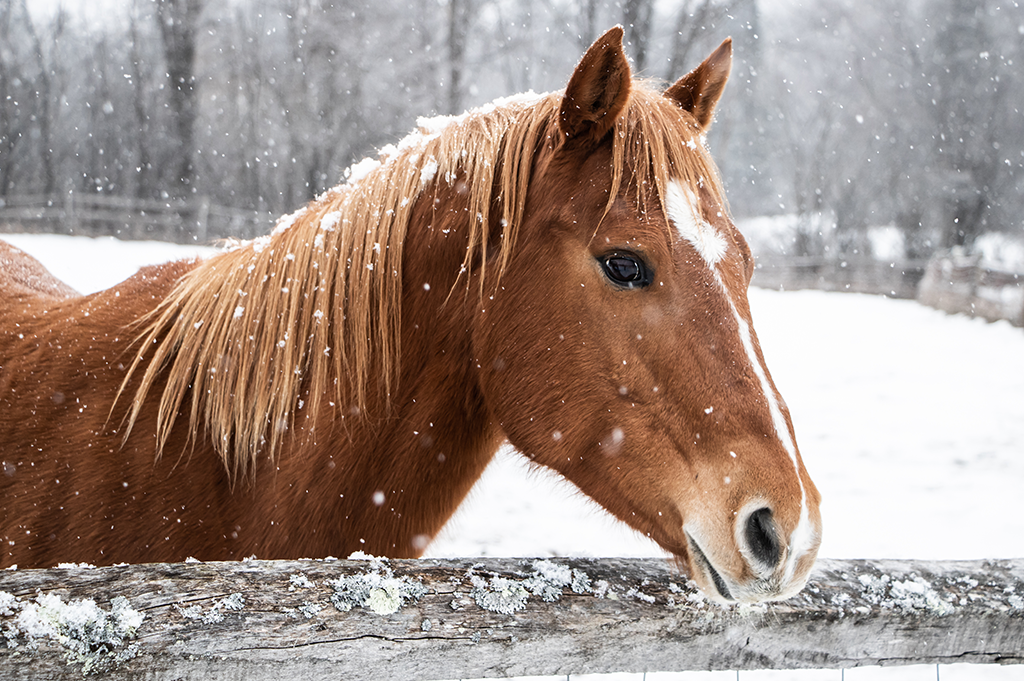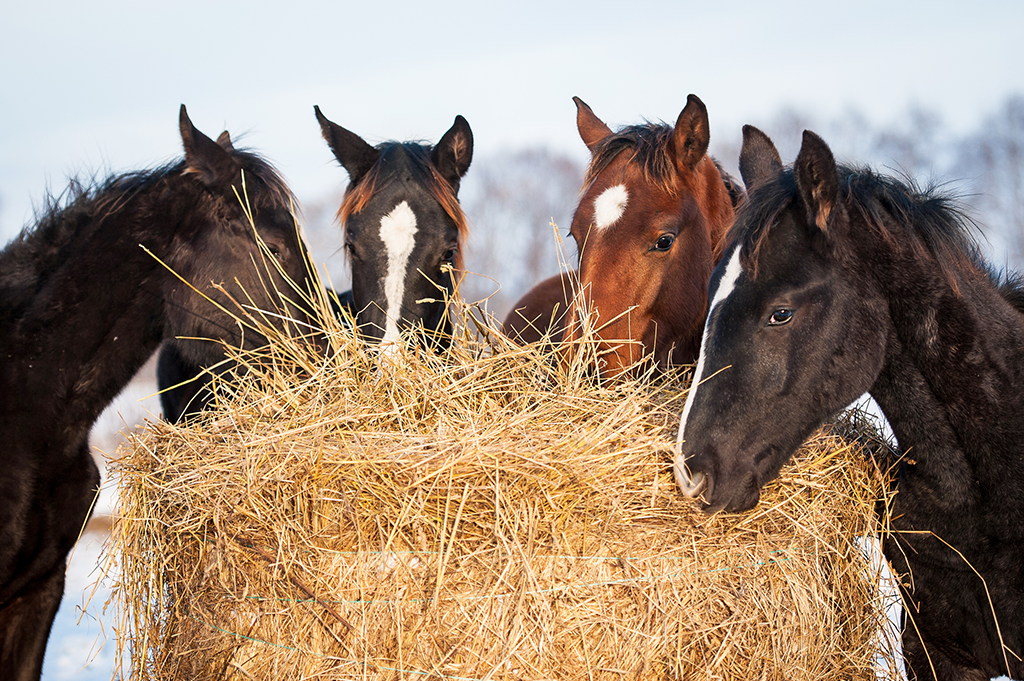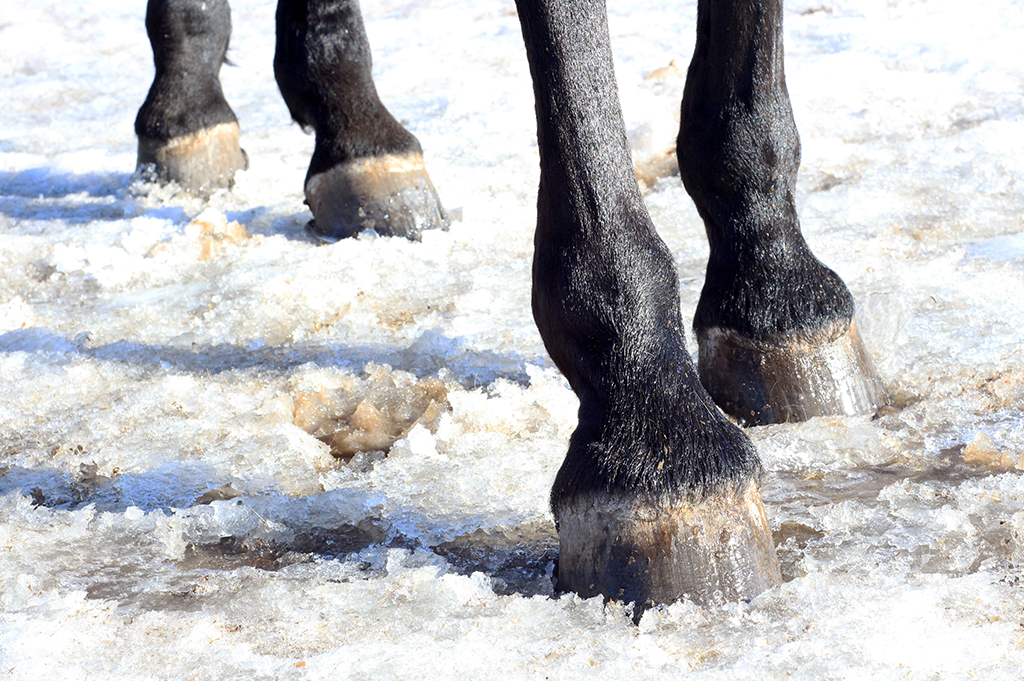
Horses have acclimatised to colder temperatures and can generally live outside year-round. There are however a few additional amenities you may want to provide to make them more comfortable. Here at The Insurance Emporium, we are all about keeping your horses healthy and happy which is why we’ve compiled a list of ways you can provide additional care for your horse over the colder winter months.
Feed Modifications
As the temperatures decrease during the winter, your horse will need additional dietary energy to maintain its body temperature and condition. The best source for this is forage (either hay or grass). Forage acts as an in-built heating system by creating heat as it breaks down in the digestive system. As a rule of thumb, your horse needs to consume 2% of their body weight per day to maintain body condition, and for every degree below -7°C horse will require an additional 1% in their diet.

Water & Salt
Water consumption plays an important role in hydration and digestion. If your horse isn’t drinking enough, it can affect how food passes along the gut, increasing the risk of impaction colic. Provide fresh clean water twice a day, and regularly check water troughs for ice. Horses prefer to drink water that is slightly warm so adding some warm water in their buckets can prevent the water from freezing overnight and may encourage your horse to drink more. If you’re using tank heaters make sure to check the water for electrical sensations or shocks. Another tactic to increase water consumption is by increasing their salt intake. You can do this by offering access to a salt block or supplementing their feed with a small amount of salt.
Shelter
If horses have access to a shelter, they can tolerate temperatures as low as -40°C, so it’s really important to offer your horse some sort of shelter from wind, sleet and storms. Offering your horse open access to a stable or an open-sided shed works well but trees are a great alternative if a building is not available.
Blankets
As the winter rolls in and days become shorter your horse will naturally develop a winter coat that produces natural oils to help keep them warm and waterproof. Horses don’t feel the cold like we do, so whilst it can be tempting to rug our horses at the first sign of frost, it’s important to assess whether it is truly necessary, as it can hinder your horse’s ability to naturally grow a thick coat.
Top Tips for Blanketing:
- Get a good fit! Poorly fitted blankets can cause sores and rub marks along the straps.
- Keep Dry! Only apply blankets to clean, dry horses.
- Remove, groom, repeat! Remove your horse’s blanket daily and groom him on a regular basis. Check the shoulder area for rubs and sores and ensure straps and surcingles are safely and securely in place.
Cleanliness & Hoof Care
A thick winter coat can hold moisture for a long time so it’s important to take some extra time and get them dry before they are put away for the day. Once the horse is dry fluff up their hair before turning out, which will help the insulating effectiveness of their coat.
The wet weather also brings a risk of fields becoming poached and muddy so try to manage the mud particularly around susceptible areas such as gateways and water points. Ensure you remove excess mud from your horse’s legs on a regular basis to avoid fungal and bacterial infections.
Horse hooves are prone to ‘ice balls’ during the winter. Ice chunks build up in the hooves, making it difficult for them to walk, and puts stress on their tendons and joints. Pick your horse’s hooves daily to remove any ice build-up and check for lacerations.

Exercise
As the dark nights draw in and evenings by the fire become more tempting, it’s more important than ever not to neglect the needs of your horse! Exercise shouldn’t stop during the winter months. Just because there’s a touch of frost on the ground, doesn’t mean your horse won’t need to get out and stretch their legs regularly. Exercising your horse in winter can sometimes pose a challenge, however, so we’re sharing our favourite tips for getting out safely in the cold with your horse!
So, there you have it, with a few extra additions to you care routine, you can keep your equine friends safe and healthy over the winter. As a horse owner, we know you want to do all you can to keep your equine friend in perfect condition and taking out horse insurance can help to protect them in the event of the unexpected. At The Insurance Emporium, we offer horse insurance with Death, Theft or Straying as standard.
All content provided on this blog is for informational purposes only. We make no representations as to the accuracy or completeness of any information on this site or found by following any link on this site. We will not be liable for any errors or omissions in this information nor for the availability of this information. We will not be liable for any loss, injury or damage arising from the display or use of this information. This policy is subject to change at any time.


